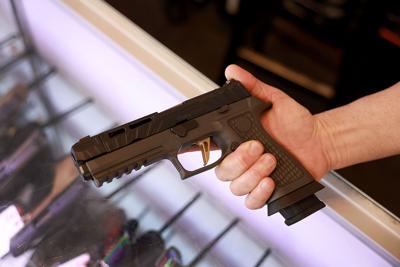A significant legal dispute has erupted between renowned New Hampshire-based gun manufacturer SIG Sauer and a prominent police training academy in Washington state, stemming from the academy’s controversial decision to ban the use of the SIG P320 pistol. This contentious firearms safety issue has ignited a national conversation, raising questions about product reliability and the rigorous standards of police training.
The Washington State Criminal Justice Training Commission (WSCJTC) implemented the ban following an in-depth investigation into persistent claims that the SIG P320 has a disturbing propensity for “uncommanded discharges,” meaning the firearm fires without the trigger being pulled. This grave concern directly challenges the foundational principles of firearms safety within law enforcement.
The WSCJTC’s decision was reportedly influenced by several high-profile incidents, including the tragic death of a U.S. Air Force Security Forces airman while wearing his SIG Sauer M18 pistol, the military variant of the P320. Further bolstering the commission’s concerns were numerous reported incidents across the United States involving the P320, some even captured on video, underscoring the severity of the alleged product liability issue.
The commission’s thorough investigation, which began in 2024 after a firearms instructor reported an uncommanded discharge at a gun range in Washington state, involved a dedicated task force. This task force meticulously reviewed reports from various police departments nationwide, ultimately leading to Executive Director Alexander’s strong public statement prioritizing safety, declaring, “My position has to be safety because we know so much now that if I make a different decision, I don’t feel like I’m being responsible.”
In response, SIG Sauer vehemently denies the allegations, asserting that the P320 incorporates five internal safety features designed to prevent unintended firing. The company’s subsequent lawsuit against the WSCJTC argues that the ban is “unnecessary, unprecedented, not well grounded in fact or law and harmful to Sig Sauer.” This legal dispute highlights the intense pressure on manufacturers to defend their product liability and reputation.
The lawsuit further contends that the ban unfairly disadvantages law enforcement officers in Washington state who are already trained on and utilize the P320, and it imposes significant “negative financial impacts” on agencies and the company itself. SIG Sauer maintains that their actions are a vigorous defense of the safety, quality, and manufacturing integrity of the P320 against what they describe as “malicious and misleading attacks.”
This legal battle in Washington state is not an isolated incident. The SIG P320 has been at the center of multiple product liability lawsuits across the nation, with a group of 22 plaintiffs filing a separate suit in U.S. District Court in Concord. Despite these challenges, SIG Sauer proudly states that 17 P320-related cases have been dismissed, reiterating their commitment to millions of users worldwide.
The company’s March statement emphasized its ongoing dedication: “As we continue to put to rest the malicious and misleading attacks against one of the most popular pistols ever made, we are committed to supporting the millions of law-abiding citizens, law enforcement agencies, and elite military units carrying our pistol every day around the world.” This underscores the high stakes of this legal dispute for both gun control advocates and firearm manufacturers.






Leave a Reply